Best VPN with DNS Leak Protection: How to Choose the Right One
Every website you visit starts with a quick whisper to the Domain Name System (DNS). If that whisper slips outside your communication tunnel, anyone, from your Internet service provider (ISP) to a coffee-shop malicious visitor, can see where you go online.
This guide breaks down why DNS leaks happen, how to run a fast DNS leak test, and what makes the best VPN with DNS leak protection. We will also showcase how VeePN keeps those queries locked away so your browsing stays only your business and why it’s the best VPN solution out there.

What DNS is and why DNS leaks happen
Think of DNS as the Internet’s phone book. Each time you type a domain, your device fires off DNS requests to translate that name into an IP address. If those packets travel outside the VPN tunnel, they expose your habits in plain text.
- Windows machines sometimes query multiple adapters at once.
- MacOS occasionally reverts to default DNS settings.
- Some apps ignore your system DNS settings and secretly use their own DNS servers to resolve websites.
All of that creates gaps where DNS leaks can slip through. You can dive deeper into how the system works in our explainer on what is DNS.
Why DNS leak protection matters for everyday browsing
Here is why it is important to have your DNS protected:
Your ISP builds a profile of every site you visit
In many countries, providers legally log these look-ups for months. A partial outage at DNSimple this April showed how much traffic funnels through third-party resolvers when attackers flood the network.
Hackers target coffee-shop Wi-Fi due to weak security practices
The SSID Confusion flaw lets attackers spoof a hotspot name, downgrade encryption, then read unprotected DNS traffic. Once they see your queries, they can push fake logins or drive-by malware.
Modern browsers still leak data
Google had to patch a Chrome bug in June that quietly leaked URL data through unsecured requests. The takeaway? Even the best TLS session cannot hide you if the first handshake spills out the site’s address.
Some mobile VPN apps are not immune to leaks
A Reddit user recently spotted a DNS leak on Android 15 that persisted across reboots even though he was using Proton VPN. Bugs like that prove why built-in solid leak protection is a must for VPNs, not a luxury.
Having walked through the importance of having DNS protection, let’s look at ways to check for DNS leaks.
How to run a DNS leak test and check for DNS leaks
Running a quick DNS leaks test takes two minutes and costs nothing:
- Connect to your VPN.
- Open ipleak.net or DNSleaktest.com in any browser.
- Click “Extended Test.” The site fires dozens of queries.
- Compare the addresses shown against your expected VPN server location.
- If you see your real home country or real ISP, you have a DNS leak.
We also advise you to run the test while connected to public Wi-Fi. Networks sometimes reroute DNS queries even when you are on a VPN. With that in mind, let’s see how exactly VPN helps to prevent DNS leaks.
How good VPNs prevent DNS leaks
A quality VPN fights leaks on several fronts, sealing off any exposed VPN traffic that could reveal where you’re headed online.
- Private DNS inside the tunnel. The service routes every lookup through its own encrypted resolver rather than your provider’s. That keeps DNS traffic under the same encryption as the rest of your data.
- Forced tunneling rules. Good clients mark the VPN adapter as the only allowed path for DNS requests. Any packet that tries a shortcut is dropped.
- Kill Switch and IPv6 block. If the connection drops, a premium VPN app cuts all traffic so you avoid an IP leak during reconnection. Blocking IPv6 stops rogue lookups some routers force on you.
- Modern VPN protocols. WireGuard and OpenVPN keep overhead low while sealing the tunnel with AES-256 or ChaCha20.
But there are hundreds of diverse VPN providers on the market, so which one to choose? Let’s have a look at the defining characteristics of a reliable and trustworthy VPN.
Criteria for choosing the best VPN with DNS leak protection
Look for the following offerings in your VPN provider:
Strict No Logs policy
A provider cannot leak what it never stores. Independent audits can prove whether your service provider truly keeps zero records of your Internet activity.
Fast speeds and reliable servers
Encryption adds overhead. Look for VPN solutions with large global networks and protocols like WireGuard that keep latency low so your Internet traffic stays snappy.
Kill Switch and multi-layer leak protection
Combine DNS, IPv6, and WebRTC shields to block every escape path. In particular, WebRTC leaks ruin privacy in most modern browsers if left unchecked.
Support across major platforms
Make sure that your VPN provider provides a solid level of leak protection on the most popular platforms: Windows, macOS, Linux, iOS, Android, and browser extensions.
Are free VPNs worth your attention?
Honestly, free VPNs are usually based on third-party resolvers which are monetizing your look-ups, and sell your DNS queries to advertisers or data brokers. Others inject ads or trackers into your browser, making it all pointless to even use such a VPN. The rest either throttle VPN traffic to make you upgrade or record your traffic and turn it over when requested. That’s why it’s better to use a reliable VPN provider like VeePN.
Why VeePN is one of the best VPN with DNS leak protection
VeePN checks every box in from above and adds a few extras tuned for privacy lovers:
Dedicated private DNS
Every VeePN VPN connection uses in-house resolvers inside the tunnel. Your device never touches outside servers, so your real IP address and browsing history stay hidden.
AES-256 encryption and WireGuard speed
Military grade AES-256 encryption ciphers scramble packets while the protocol keeps performance high. Stream 4K or play online games without stutters.
Automatic Kill Switch and NetGuard
If Wi-Fi drops for a split second, the Kill Switch halts traffic. NetGuard blocks ads, trackers, and malicious domains that might force fake DNS redirects.
Global network with unlimited connections
2,500 servers in 89 countries give you plenty of distance from nosy government agencies. Protect up to ten devices at once so every gadget in the house enjoys leak protection.
Audited No Logs promise
Based in privacy-friendly Panama, VeePN stores nothing about your sessions. Independent reviewers verify the policy.
Extra tools for power users
Split tunneling, double hop routing, and an option to hide your IP address with an anonymous IP give you granular control that other VPNs skip.
Try using VeePN without risks, as we offer a 30-day money-back guarantee.
Step-by-step: how to enable DNS leak protection in VeePN
- Grab a subscription that fits your needs from the pricing page.
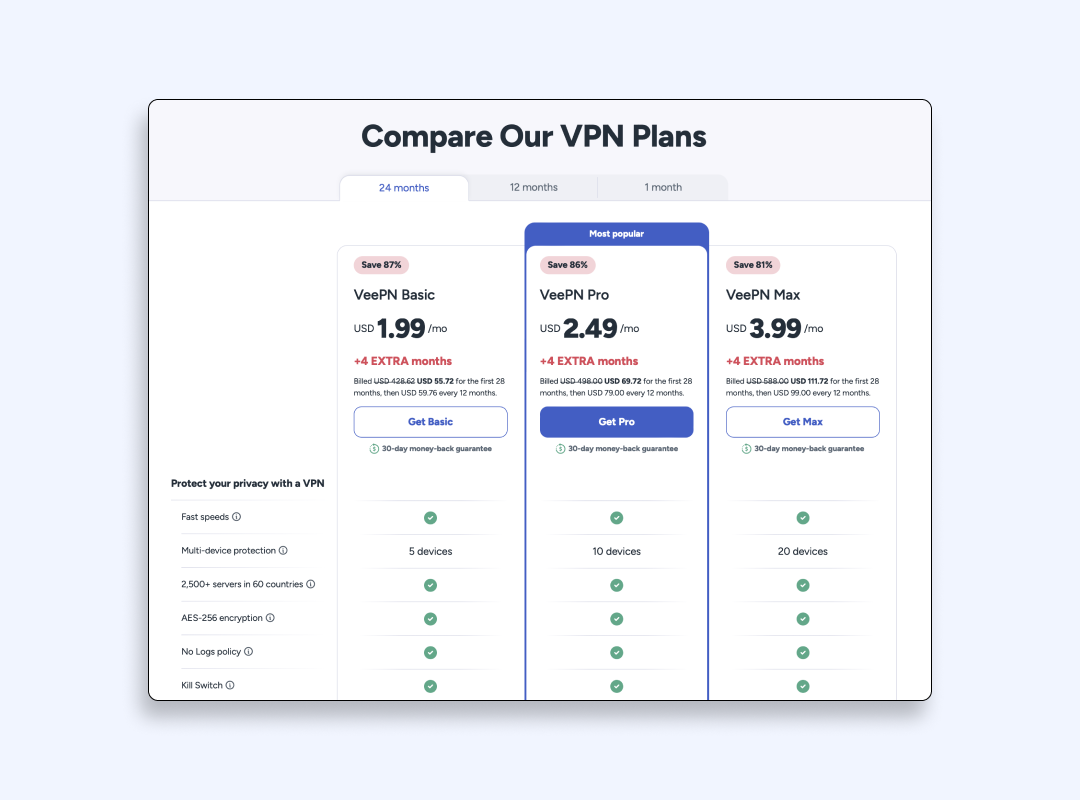
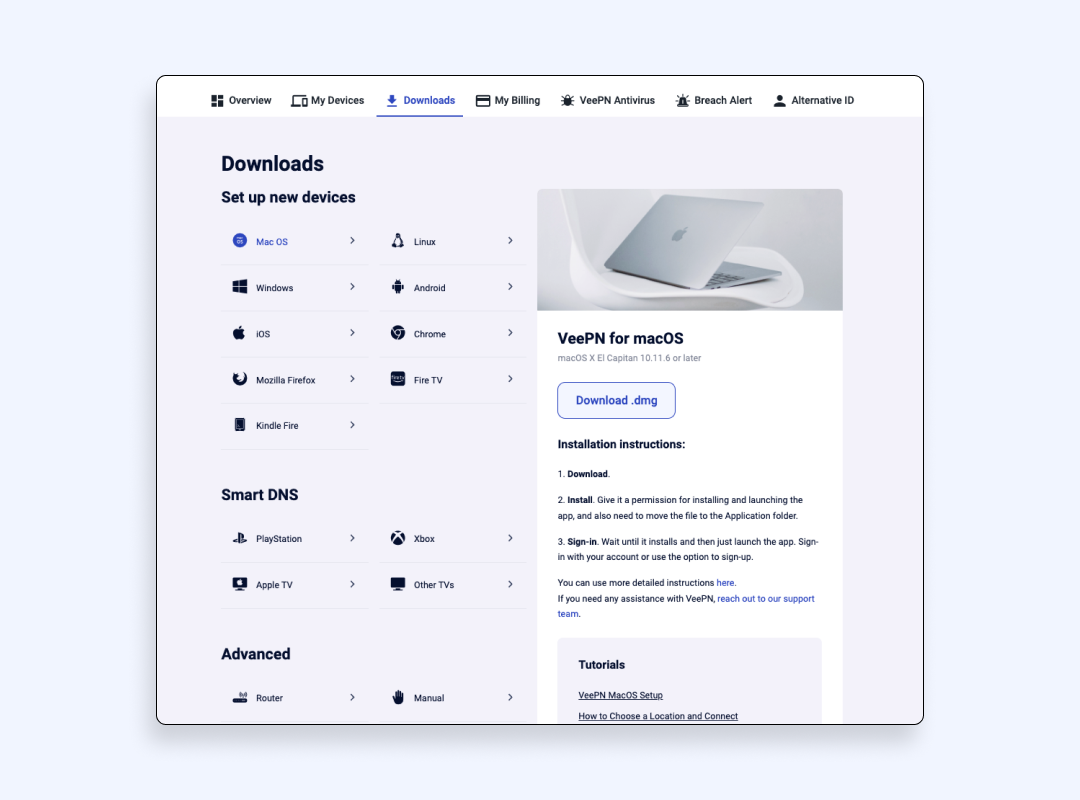
- Launch the app and pick the fastest server or any location you like.
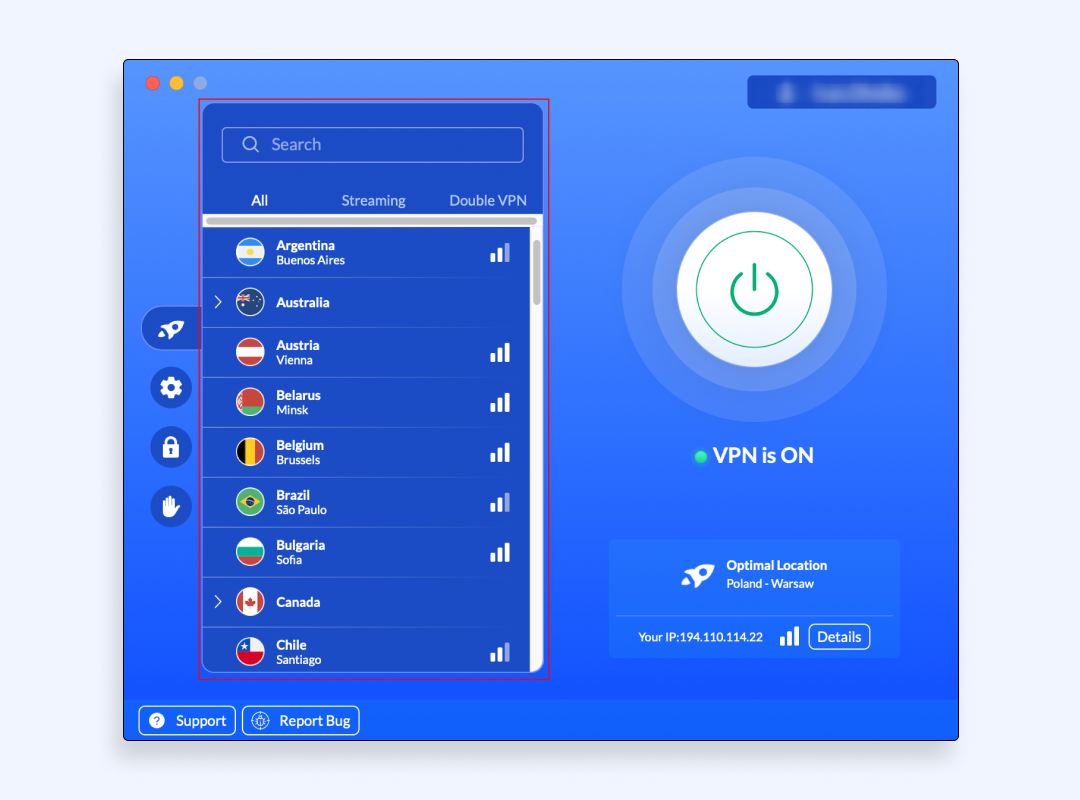
- Open Settings and ensure Kill Switch is toggled on (it is on by default).
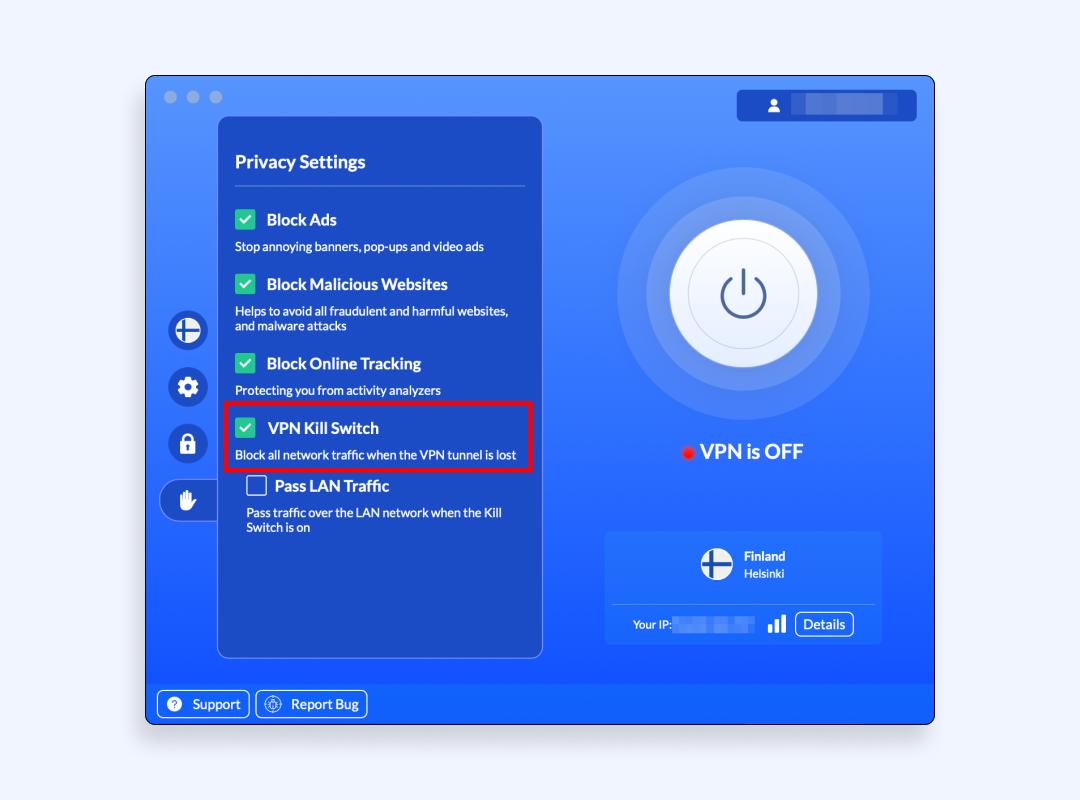
- Turn the VeePN on.
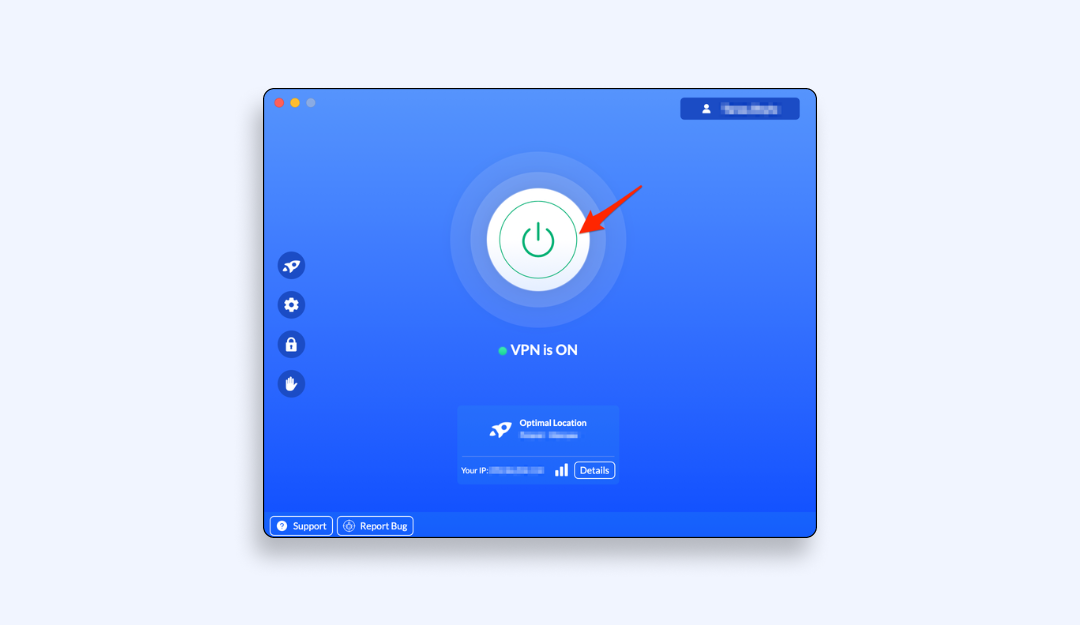
Your VPN DNS is now live and you can browse confidently. If you ever hit a snag, the troubleshooting guide on VPN not working walks you through quick fixes.
FAQ
A DNS leak happens when your device sends DNS requests outside the secure VPN channel. Anyone on the path, including your ISP, can log those look-ups and build a profile of your browsing habits.
- Connect to your VPN
- Visit a reputable DNS leak test sites like ipleak.net or DNSleaktest.com
- Compare the listed resolvers with your chosen server location.
If you spot addresses tied to your home country, you have a leak.
First, enable DNS leak protection or Kill Switch in your VPN settings. If the problem persists, switch protocols, block IPv6, or update the client. In rare cases you may need to change OS-level DNS to 0.0.0.0 so only the tunnel resolver is used.
VeePN is freedom
Download VeePN Client for All Platforms
Enjoy a smooth VPN experience anywhere, anytime. No matter the device you have — phone or laptop, tablet or router — VeePN’s next-gen data protection and ultra-fast speeds will cover all of them.
Download for PC Download for Mac IOS and Android App
IOS and Android App
Want secure browsing while reading this?
See the difference for yourself - Try VeePN PRO for 3-days for $1, no risk, no pressure.
Start My $1 TrialThen VeePN PRO 1-year plan







